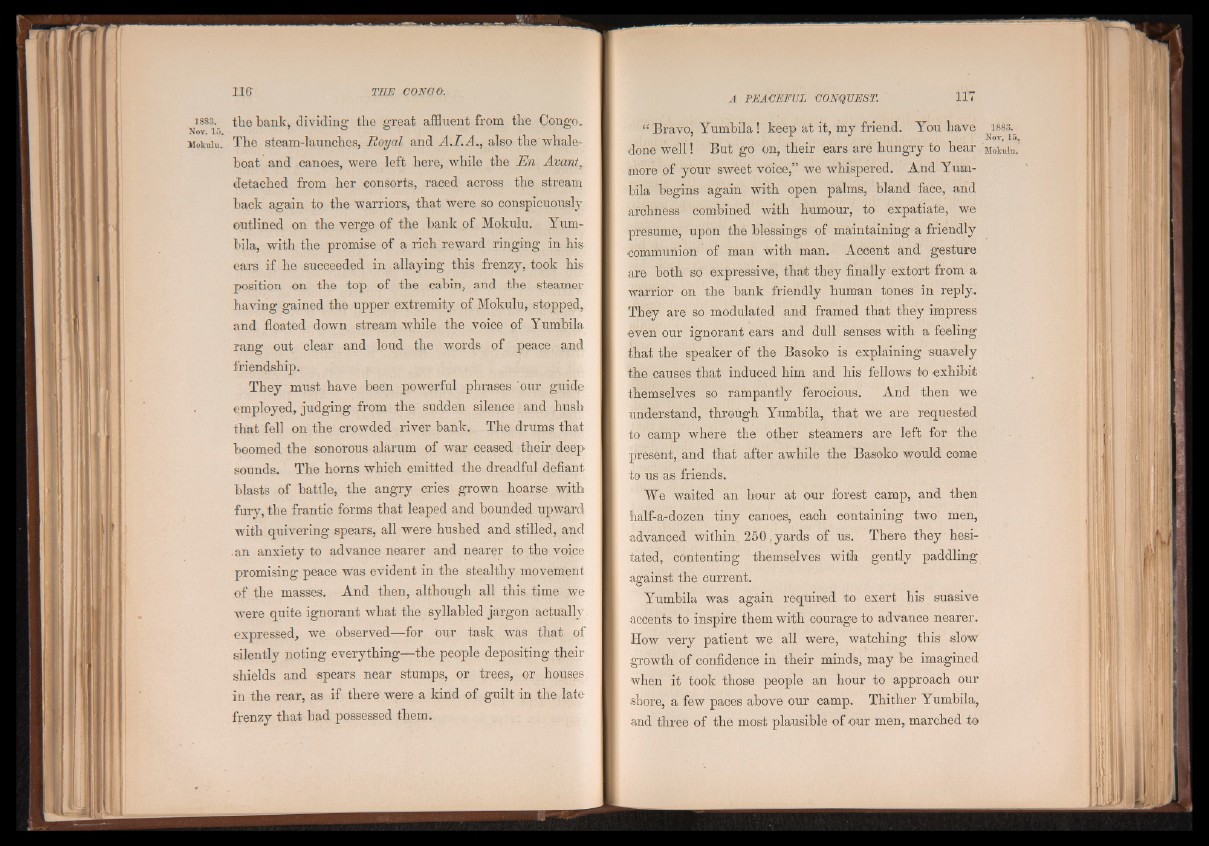
Mokulu.
the hanky dividing the great affluent from the Congo.
The steam-launches, Royal and A.I. A., also the whaleboat
and canoes, were left here, while the En Avant,
detached from her consorts, raced across the stream
back again to the warriors, that were so conspicuously
outlined on the verge of the bank of Mokulu. Yum-
bila, with the promise of a rich reward ringing in his
ears if he succeeded in allaying this frenzy, took his
position on the top of the cabin, and the steamer
having gained the upper extremity of Mokulu, stopped,
and floated down stream while the voice of Yumbila
rang out clear and loud the words of peace and
friendship.
They must have been powerful phrases 'our guide
employed, judging from the sudden silence and hush
that fell on the crowded river bank. The drums that
boomed the sonorous alarum of war ceased their deep
sounds. The horns which emitted the dreadful defiant
blasts of battle, the angry cries grown hoarse with
fury, the frantic forms that leaped and bounded upward
with quivering spears, all were hushed and stilled, and
• an anxiety to advance nearer and nearer to the voice
promising peace was evident in the stealthy movement
of the masses. And then, although all this time we
•were quite ignorant what the syllabled jargon actually
expressed, we observed—for our task was that of
silently noting everything—the people depositing their
shields and spears near stumps, or trees, or houses
in the rear, as if there were a kind of guilt in the late
frenzy that had possessed them.
“ Bravo, Yumbila ! keep at it, my friend. You have
done well! But, go on, their ears are hungry to hear
more of your sweet voice,” we whispered. And Yumbila
begins again with open palms, bland face, and
archness combined with humour, to expatiate, we
presume, upon the blessings of maintaining a friendly
communion of man with man. Aceent and gesture
are both so expressive, that they finally extort from a
warrior on the bank friendly human tones in reply.
They are so modulated and framed that they impress
even our ignorant ears and dull senses with a feeling
that the speaker of the Basoko is explaining suavely
the causes that induced him and his fellows to exhibit
themselves so rampantly ferocious. And then we
understand, through Yumbila, that we are requested
to camp where the other steamers are left for the
present, and that after awhile the Basoko would come
to us as friends.
We waited an hour at our forest camp, and them
half-a-dozen tiny canoes, each containing two men,
advanced within 250.yards of us. There they hesitated,
contenting themselves with gently paddling
against the current.
Yumbila was again required to exert his suasive
accents to inspire them with courage to advanee nearer.
How very patient we all were, watching this slow
growth of confidence in their minds, may be imagined
when it took those people an hour to approach our
shore, a few paces above our camp. Thither Yumbila,
and three of the most plausible of our men, marched to
1883.
Nov, 15,
Mokulu.